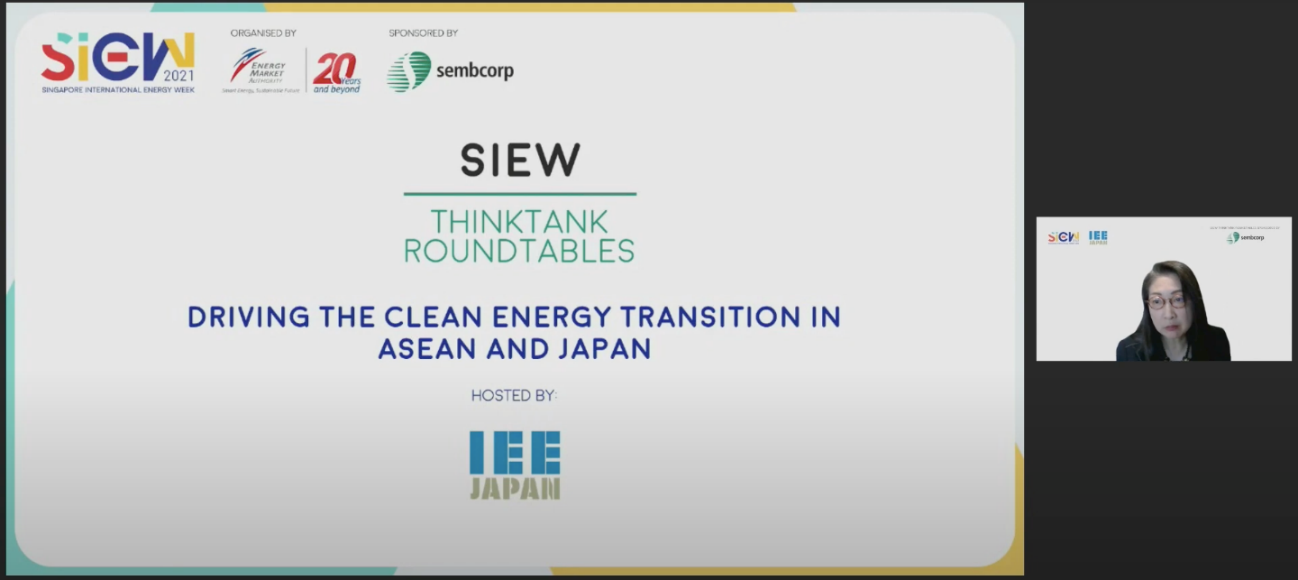
The Thinktank Roundtable organised by the Institute of Energy Economics, Japan (IEEJ) on “Driving the Clean Energy Transition in ASEAN and in Japan”, featured insights from the IEEJ Outlook 2022 and the challenges to the prospect of decarbonisation in ASEAN and Japan. The discussion focused on how ASEAN, comprised of countries at different stages of development, can tackle the challenges to a clean energy transition and what key learnings ASEAN can take from Japan’s energy transition process. The speakers also exchanged views on how ASEAN can work with Japan to develop possible solutions and roadmaps for its clean energy transition.
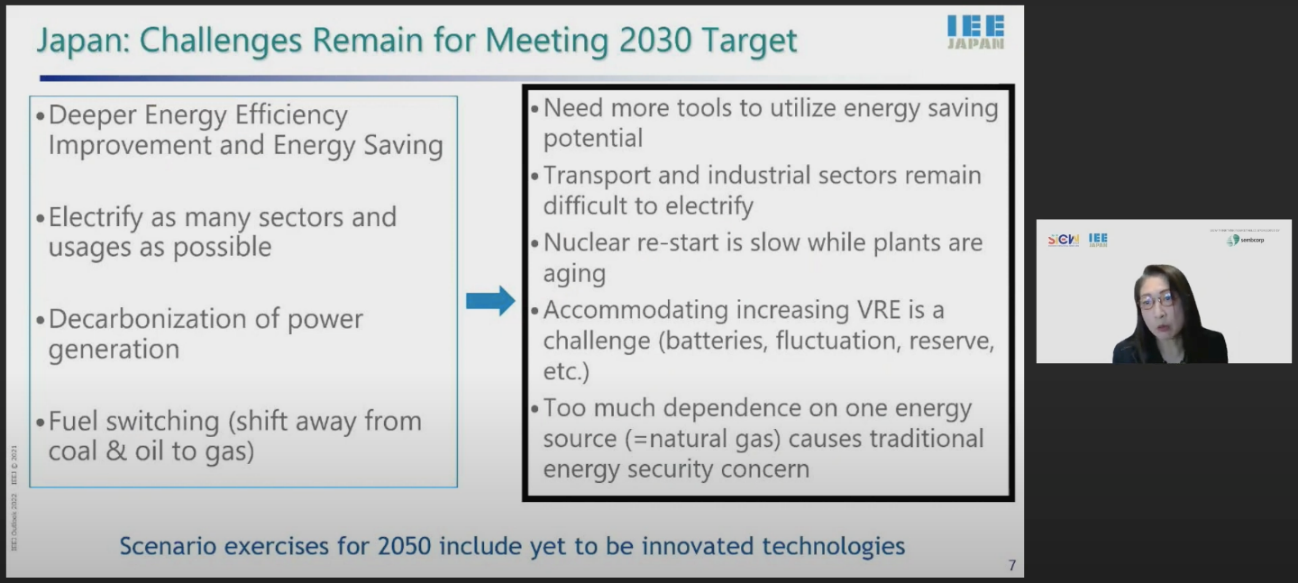
Ms Yukari Yamashita, Managing Director, Energy Data and Modelling Centre, IEEJ, kick started the session by outlining the recently released Japan’s 6th Basic Energy Strategy required to meet the 2030 raised target of CO2 reduction. She emphasised that to achieve this ambitious target, more energy efficiency improvement in energy demand sectors and an earlier shift to clean energy in the power generation sector are necessary. She also noted that while Japan aims to reduce demand via greater energy efficiency and seeks to increase the renewables’ share in the power mix, the country remains heavily reliant on natural gas. This is causing energy security concerns and impediments to the electrification of non-power generation sectors, such as transport and industry.
Ms Yamashita highlighted the findings of IEEJ’s Outlook 2022, including the large increase in CO2 emissions that can be seen in the countries that have not expressed carbon neutrality, and the need to improve the stability and security of the electricity supply. She reiterated that attaining an overall carbon neutrality would require not only decarbonising the power generation sectors but the non-power generation sectors as well. This can be achieved by using clean hydrogen/ammonia and synthetic methane.
With regards to trade relationships, Ms Yamashita said that Asia’s multilateral ties with the Middle Eastern countries remain crucial, despite energy trade shifting to cleaner fuels. The relevant parties can continue to share and exchange decarbonisation technologies.
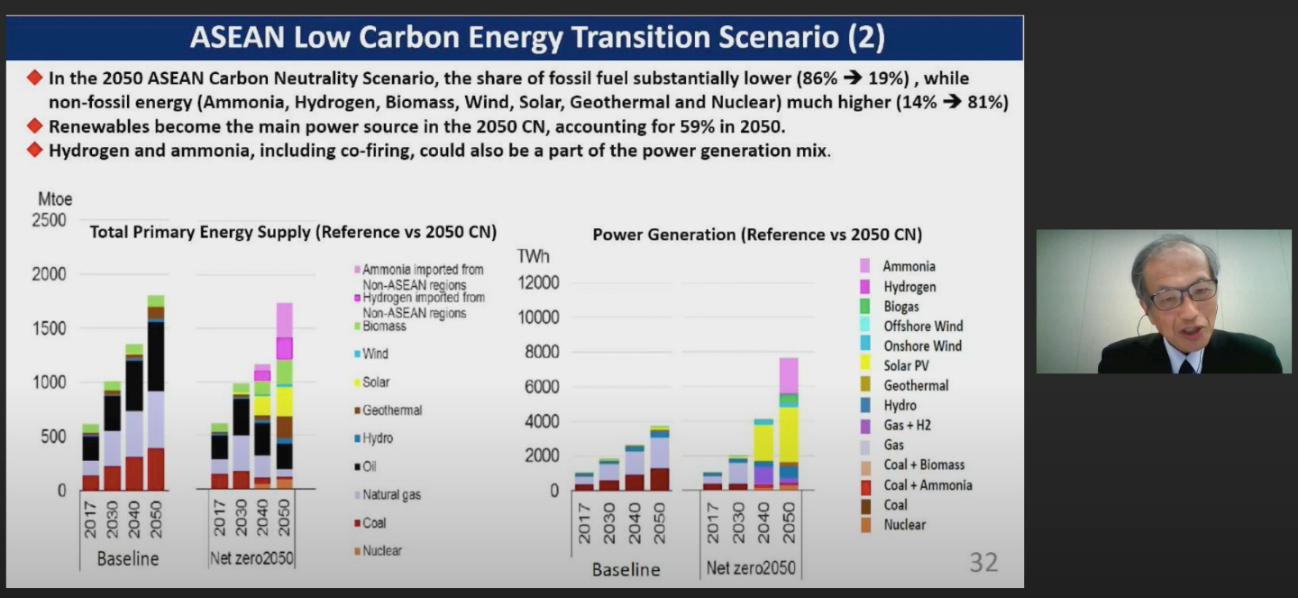
Professor Jun Arima, Senior Policy Fellow for Energy and Environment, the Economic Research Institute for ASEAN and East Asia (ERIA) and Professor at University of Tokyo, presented how fossil fuel will remain dominant in the ASEAN energy mix for power generation for the coming decades, even under the Alternative Policy Scenario (APS) in the ERIA Energy Outlook. To achieve carbon neutrality goals, Prof Arima echoed Ms Yamashita’s emphasis on the deployment of clean energy technologies within the ASEAN region (for example, hydrogen imports, solar and wind renewable energy). He added that to reduce CO2 emissions effectively, a higher priority on affordable technologies in the mid-term must be set while more expensive technologies should be considered in the last stage of completing carbon neutrality.
Under the 2050 ASEAN Carbon Neutrality Scenario, Prof Arima noted how the share of fossil fuel for power generation will be significantly lower, while the share of renewable energy sources will increase. Prof Arima explained that priorities and the pathways towards carbon neutrality for different countries differs. Cost reduction and international cooperation necessary for affordable decarbonisation are key in the region. In his opinion, Prof Arima recommended that each country must consider its own circumstances while adhering to policy objectives. Countries must ensure that they have available, accessible, and affordable energy supply to facilitate the transition towards a carbon-neutral future.
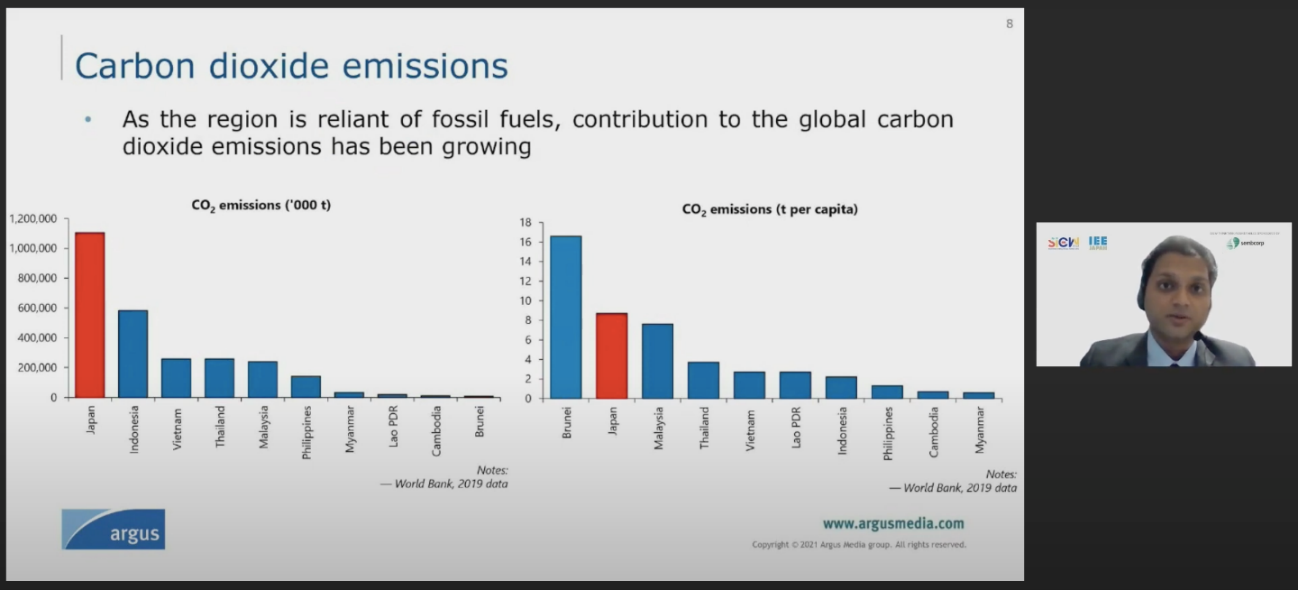
Touching on the potential for collaborations between ASEAN and Japan, Dr Neil D’Souza, Principal Consultant at Argus Media, highlighted the importance of increasing the capital for energy transition and the willingness to pay for low carbon technologies to accelerate energy transition within ASEAN.
Dr D’Souza believed that the energy transition can serve as an opportunity for growth in the macroeconomy with the creation of new industries. To encourage the uptake of clean technology in ASEAN, Dr D’Souza invited Japan and other countries to test-bed their clean energy technologies in the region. He concluded by advocating the need for decarbonisation roadmaps to guide policymakers by specifying how net-zero targets can be achieved.
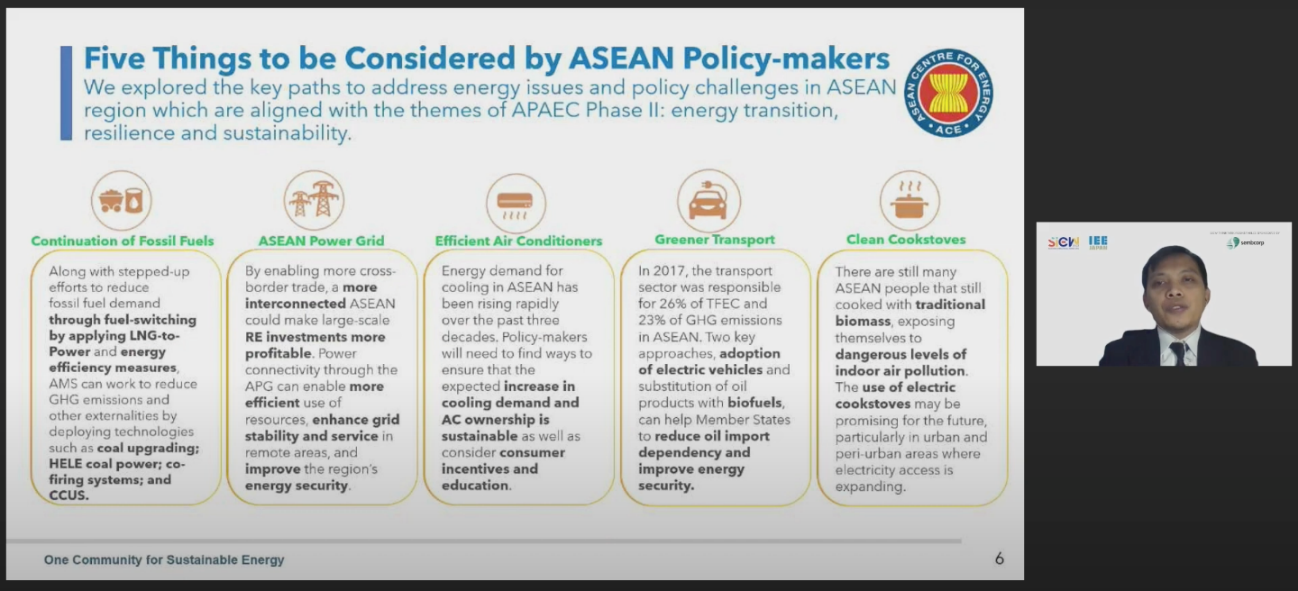
Representing the ASEAN Centre for Energy (ACE), Technical Officer of Power, Fossil Fuel, Alternative Energy and Storage, Mr Suwanto outlined key findings from the 6th ASEAN Energy Outlook (AEO6), the latest flagship publication by ACE. He said that even in the most ambitious Renewable Energy target considered in the APAEC Targets Scenario (APS), the ASEAN region Total Primary Energy Supply (TPES) will rely on fossil fuels (coal, oil, and natural gas) for around 70%, in 2040. He emphasised that as the region is shifting from agricultural to industrialisation, it is experiencing a significant increase of energy demand to support its economic and population growth. Thus, energy security would be an important issue to sustain development.
In the light of the situation, Mr Suwanto shared how regional collaboration can play an important role in meeting the bloc’s renewable energy targets and increasing the share of renewable energy for power generation. He further elaborated on the various paths that ASEAN policymakers should consider in addressing energy issues, such as improvements to the grid, the interconnection of a regional grid, the adoption of electric transportation, and the use of electric energy-efficient cookstoves.
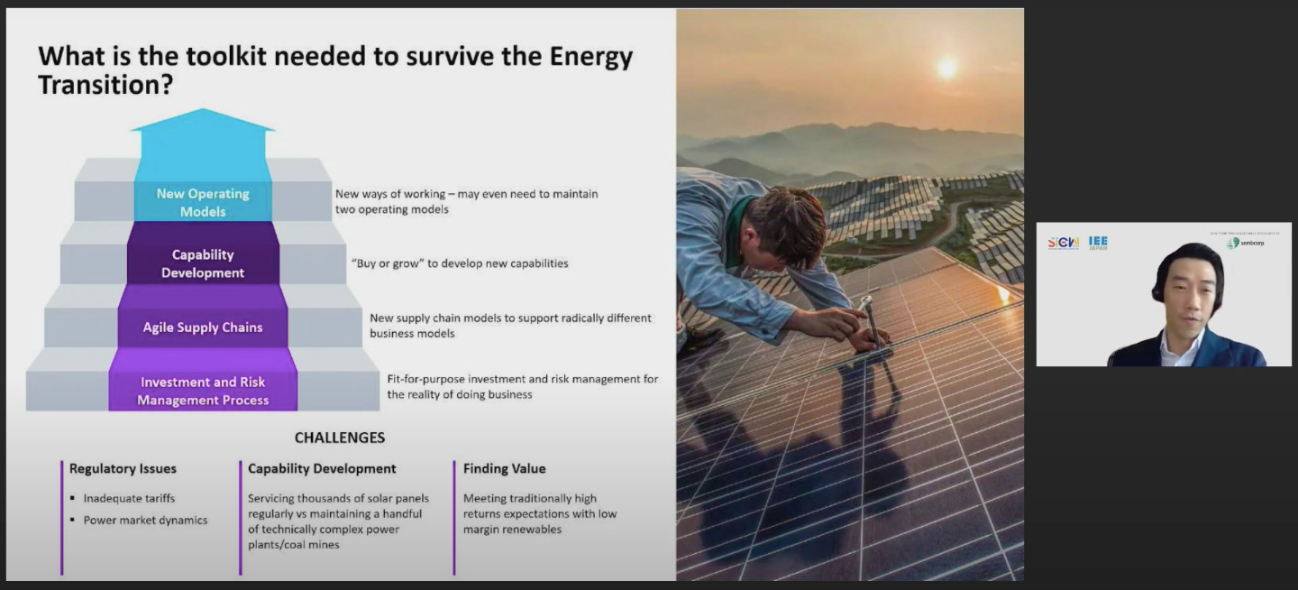
Mr Matthew Yeo, Managing Director – Resources, Energy Transition Lead at Accenture, analyzed sustainability and concluded that it is being driven by many real factors such as consumer, investor, and regulatory pressure. This energy transition is unlike any other in the past because it is driven by very fundamental forces such as societal and global pressures. Mr Yeo shared his view that sustainability is gaining popularity within the ASEAN region, with banks and investors pressuring companies to switch to cleaner energy. He noted that technology is key in achieving cost parities and enabling new operating models in the region.
While Mr Yeo echoed the point that fossil fuel will remain a dominant energy source in ASEAN, he also pointed out that member countries are showing commitment to move towards the adoption of cleaner energy, such as using renewable sources to generate power in rural areas of Indonesia and the Philippines. Mr Yeo also cited the importance of establishing new operating models and agile supply chains, as well as developing new capabilities. He concluded with a presentation on how data analytics, artificial intelligence, and drones facilitate the planning and development of clean energy technologies.
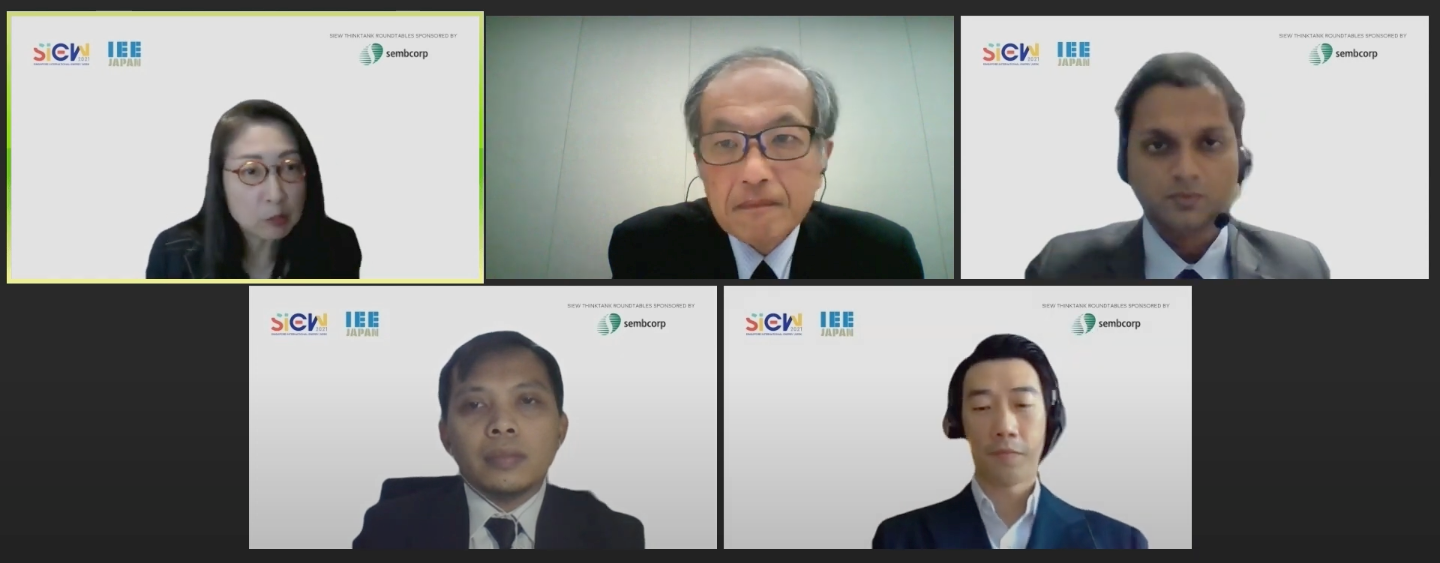
During the moderated panel discussion, Prof Arima raised his concern on common challenges faced by ASEAN and Japan in driving the clean energy transition. He emphasised that because of the high import dependence of fuel and the limitation of grid size for accommodating variable renewable due to their geomorphic characteristic, it would be a tough challenge to simultaneously achieve cost affordability and a low-carbon future in the region. Considering the growing energy demand and economic growth, carbon capture and recycling technology is one of the key measures for carbon neutrality in the region.
As affordability remains a challenge for the shift to clean energy in ASEAN, Mr Yeo shares his optimism that new technologies such as carbon capture technology might benefit from a large potential of carbon storage capacity in the coastal area. He also exemplified that with government incentives becoming available to encourage the uptake of these technologies, solar PV can now be scaled for implementation in rural areas.
On the topic of interconnection, Mr Suwanto shared that ASEAN member countries are currently collaborating on a regional grid project to enhance the security and sustainability of their grids.
Regarding a question raised from the live Q&A on the roadmap to carbon neutrality, Dr D’Souza replied that the roadmap should first be drawn up by each country, because of the diversification in social background. In terms of economic efficiency, however, it would be important to draw an ASEAN regional roadmap that enables trans-ASEAN grid interconnection.
Panellists also shared their views on the question of restructuring the carbon tax in a manner that does not burden the economy and public consumers. They pointed out that a harmonised carbon tax in the region would be ideal but would also face tremendous challenges; a gradual increase in tax rates would be more viable. A complimentary idea to the carbon tax was to modify the levels of current fossil fuel subsidies to reflect externalities.
Access the 2021 SIEW Thinktank Roundtable sessions on-demand here for more insights. Sign up to receive alerts on future SIEW events.